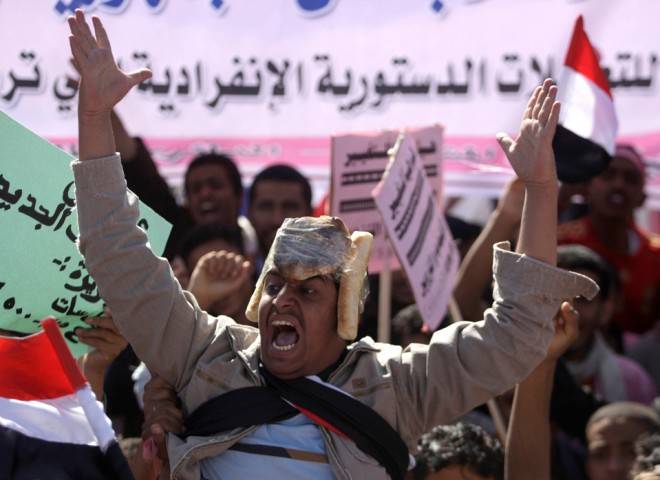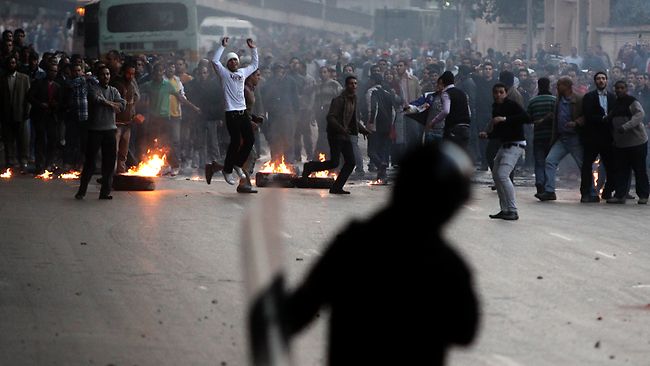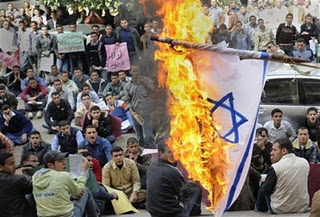
THINK-ISRAEL |
The ultimate symbol of Muslim Democracy may not end up being the purple fingers of the Iraqi ballots but the smoke from burning churches and dead Coptic Christians in Egypt. While Iraq was tenuously balanced between Shiites and Sunnis, Arabs and Kurds, there is no such balance in Egypt. The average Egyptian is a Sunni Arab and thinks Christians are dogs. Church burnings are as close as Egypt is ever likely to get to democracy and we should be happy for that.

The Muslim world is so enthusiastic about democracy because it allows the majority to slap around the minority-- at least more so than it's already doing. And when there isn't a clear majority to sit in the driver's seat, they throw in musical chairs coalitions of different ethnic and religious factions in between bouts of civil war.
That's the situation in Lebanon and in Iraq, but those countries are lucky because the minority there is a sizable enough to have a shot. That's more than can be said for Egypt's Christians who are big enough to be targets, but not big enough to take on the majority. Egypt and Iraq were the region's last bastions of Pan-Arabism, which allowed Christians Arabs a limited stake in the country, but an Iraq and Egypt defined by an Islamic identity are countries incompatible with a non-Muslim minority.
Minorities may do better under Muslim tyrannies than Muslim democracies, because dictators find a minority group with few options other than the regime to be useful. Libya's Africans did better under Khaddafi. Egypt's Christians did better under Mubarak. Dictators like a little divide and conquer because it keeps their people off balance. Democracies are another matter.
Democracy is a great slogan for Westerners who approach it from their own blinkered perspective and assume that it means the same thing to the people using it thousands of miles away as it does to them. To Americans, democracy is the unexamined assumption that popular power goes hand in hand with freedom. To Muslims it's the equally unexamined assumption that democracy is the national will to unite a country by purging it of all its divisive elements.
American pundits on the left and right made the fallacious assumption that democracy equates to tolerance for minorities when they thoughtlessly endorsed Tahrir Square and the Arab Spring. An assumption that was not founded on history or reason, but on wishful thinking. The modern state which provides maximum political representation to minorities is if anything quite undemocratic and brought into being through mainly undemocratic institutions.
The same unexamined assumption that led Bush to frame the problem as one of tyranny standing against democracy, led his successors who despised his legacy and ideas, to go ahead and follow a variation of the same path. But tyranny need not be the opposite of democracy, if it is what most of the people want. And Islamism need not contradict democracy.
Women can vote in Iran, they just can't vote to change their status. Christians can vote in Egypt, they just can't vote themselves equal rights. Islamism can function as a democratic tyranny, so long as the majority of the population agrees with their basic premises. And if the population doesn't, then elections are rigged, the bullets start flying and the prisons fill up.
Saddam's chief Shiite oppositionist cleric, Mohammad Baqir al-Sadr, (father-in-law of the troll of Sadr City) came up with an Islamist democracy by treating the public as the guardians of Islam. The obvious motivation for that was to deny the legitimacy of Saddam and his Sunni allies by moving the point of legitimate authority from the rulers as the guardians of Islam, to the Shiite majority.
That selectivity also delineates the borders of Islamic democracy. The Koran is still the Constitution and the people derive their power from the Koran, rather than the other way around. And this form of democracy can only empower Muslims to enforce Islam. If they deviate from Islamic norms, then they have lost the right to govern themselves. Non-Muslims cannot serve as guardians of Islam at all.
Treating popular democracy as a means of enforcing Islamic norms may seem progressive to the same sort of people who lecture enthusiastically on Mohammed's enlightened treatment of women, but it's really just a way for the Islamists to displace the dictators who may be brutal bastards, but aren't particularly interested in enforcing veiling or flogging men who don't grow beards.
It may make a small degree of difference to us how the population of a place thousands of miles away chooses to be oppressed, but for the minor fact that their Islamist rulers hate us quite a bit more and their hatred has global ambitions.
The Bush era assumption that the hostility was driven by dictatorships was one of the odder canapes served at diplomatic dinner parties. While dictatorships certainly did everything they could to spread hate toward America and the West, they were riding on the backs of an existing hatred. Much as the attacks on Christians in Egypt today are not populist in planning, but are populist in execution.

The problem with Muslim democracy is at the heart of all the fallacious assumptions that said it could be fixed through a change of government. The problem did not originate with governments. And that means it will not go away with a change of government. A change of government is fine for removing a Saddam or a Khaddafi, just so long as it's not done on the assumption that what will follow will be a happy place full of frolicking bunnies and the Bill of Rights in Arabic.
Our collision with Islamic democracy is a result of their dysfunction and ours. They cannot justify any course of action without resorting to the Koran and national pride. We cannot justify any course of action without turning it into a humanitarian mission to make the world a better place.
Our response to September 11 shifted from getting those responsible to creating women's rights in Kabul and civil rights for the Shiites in Sadr City. Ten years and thousands of deaths later, the former is as likely to survive our departure as an ice sculpture in the desert, and the latter has empowered our enemies.
Instead of dreaming of Bin Laden's head on a platter, we began entertaining lunatic visions of the patron saint of democracy climbing down the Muslim chimney to leave presents of civil rights under the big Eid tree. And the root cause of that fallacy is that we thought that if we made them like us, there would no longer be any reason to fight them.
Such cultural colonialism when consciously practiced is a tool of empire, but we did not practice it consciously because we were no longer aware of our own exceptionalism. Our reality had become universal. We thought that everyone had our rights or wanted them, forgetting that our idea of rights and its accompanying form of government evolved from our centuries of political struggle. They could no more be grafted on to an alien society, than you could convey everything that has made you who you are to a stranger.
Our governments are outgrowths of our culture, so are theirs. Ours depend on unspoken assumptions that we rarely question or that we simply take for granted. So do theirs. And when we tried to graft a government that was more like ours on a culture that was nothing like ours, it was their culture that ended up defining the government more than ours.
The internationalist assumption that laws are more important than cultures, and that global bodies can make law for all is an absurdity from the minds of Western progressives and a few international accomplices. The very idea that legal rationalism is more important than the traditions of culture and religion could only have been conceived of by a certain type of Western progressive, who is also the only type of creature who could believe that anyone outside his or her circle would accept such a thing at face value.
The American assumption that democracy would be issue based, rather than ethnic or religion based hardly passes the smell taste even back in the old 50, where districts are gerrymandered by law to fit certain ethnic and racial groups, and the current occupant of the White House got there more on the color of his skin than the content of his character. But overall we actually do manage to vote on the issues. At least most of us and in most elections.
Over near the pyramids, the driving issue is not the cost of health care or whether there is a right to bear arms, but how to solve all the problems in one neat bundle by unifying the country under some grand philosophy. Either Pan-Arabism or Pan-Islamism. Pick the right national identity and the rest takes care of itself.
Some of that ugly taint was in the air in the last presidential election. A taint that some conservative commentators peculiarly cheered as if tens of millions of people voting on race, rather than issues, was not a perversion of democracy to be ashamed of. It was the engine behind a campaign that was built on the insistence that updating our identity would also fix a constellation of problems. The folly of that had been demonstrated by Tony Blair's reign across the ocean, but few Americans had ever paid attention to him as anything but the neighbor next door who occasionally stopped by to offer military assistance or borrow a cup of steel tariffs.

The mistake that Americans rarely make, is the one that Muslim countries make all the time. The idea of an issue based democracy sounds good to them in theory, but the only issue that really ends up mattering is what role the Koran will play and what to do about all those "outsiders" who are causing all the problems. Attack their embassy and burn their churches. That will show them.
It takes a certain degree of maturity to take responsibility for causing your own problems. And that degree of maturity may also be what is required for representative government to be anything more than a lynch mob with a ballot box.
In the Muslim world problems are external, the work of secret conspiracies, international enemies and witches, not to mention black dogs, women and infidels. Unity comes from identifying that outside source of the problem and uniting against it. Then everyone can smile at a burning church, exchange photos of the Israeli flag being pulled down and feel like they have something in common.
The trouble with Muslim democracy is that democracy is only as good as the demos. When most of the population is unwilling to engage in self-criticism, but eager to create unity through bigotry, then its democracy will be a lynch mob with a ballot box. And no amount of rhetoric will change that. Only responsible people can use power responsibly, and while we are all irresponsible to a degree, the degree of our irresponsibility can be seen in the practice of our politics.
In the final analysis the trouble with Muslim democracy is the Muslims.
Daniel Greenfield is an Israeli-born artist, writer and freelance
commentator on political affairs with a special focus on Jewish concerns
and the War on Terror. He maintains a blog at
www.sultanknish.blogspot.com. This article was posted there October 12, 2011
and is archived at
http://sultanknish.blogspot.com/2011/10/
trouble-with-muslim-democracy.htm.